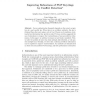Free Online Productivity Tools
i2Speak
i2Symbol
i2OCR
iTex2Img
iWeb2Print
iWeb2Shot
i2Type
iPdf2Split
iPdf2Merge
i2Bopomofo
i2Arabic
i2Style
i2Image
i2PDF
iLatex2Rtf
Sci2ools
113
Voted
CTRSA
2004
Springer
2004
Springer
Improving Robustness of PGP Keyrings by Conflict Detection
Abstract. Secure authentication frequently depends on the correct recognition of a user's public key. When there is no certificate authority, this key is obtained from other users using a web of trust. If users can be malicious, trusting the key information they provide is risky. Previous work has suggested the use of redundancy to improve the trustworthiness of user-provided key information. In this paper, we address two issues not previously considered. First, we solve the problem of users who claim multiple, false identities, or who possess multiple keys. Secondly, we show that conflicting certificate information can be exploited to improve trustworthiness. Our methods are demonstrated on both real and synthetic PGP keyrings, and their performance is discussed.
| Added | 20 Aug 2010 |
| Updated | 20 Aug 2010 |
| Type | Conference |
| Year | 2004 |
| Where | CTRSA |
| Authors | Qinglin Jiang, Douglas S. Reeves, Peng Ning |
Comments (0)

